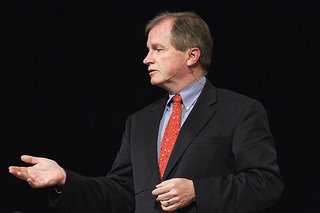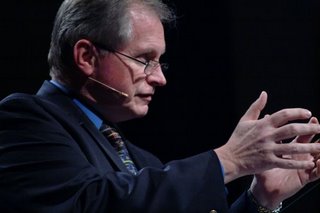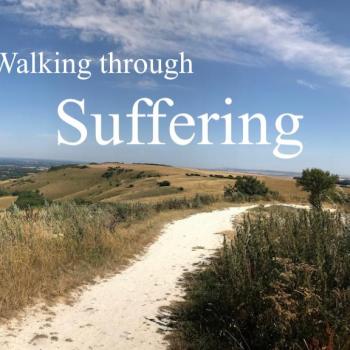This is the second part of a two-part interview with Don Carson, which began yesterday. That segment can be read here. I previously shared the video of this interview here.
*************************
Adrian
So obviously from your own story, and also in your current role, you must have seen lots of people come through that path. Do you have any thoughts about how the Church can best develop its future leaders, or how, indeed, those people who might be beginning to feel similar stirrings to you, all those years ago—how do we turn somebody who is keen on God’s Word and might show some potential into a future preacher or future leader?
Don
It’s hard to answer that in just a few sentences. 2 Timothy 2:2 insists that senior people ought to be looking for junior people who will prove faithful in passing on the gospel yet one more round. And that means inevitably that they should not only challenge them as to what they are going to do with their lives, but provide them some venue for service, some test of gifts, some beginning ministry, supervise them, mentor them, challenge them. Not just say to them, “Go and give a talk here,” but work on the talk with them, listen to it, offer critique, make sure they are growing, give them things to read, put them in situations where they’re outside their comfort zone and have to bear witness to this sort of thing, see if they grow and are flourishing spiritually and mentally. And then with time, discerning people will begin to see if there really is potential there, and the individual himself may begin to see this as part of God’s gifting and calling. I do think we ought to be more proactive in tapping people, while still recognizing that finally the thing must be confirmed by God himself. Yet, nevertheless, if 2 Timothy 2 means what it says it means, then it seems to me we ought to be a little more proactive than we have sometimes been.
And that means inevitably that they should not only challenge them as to what they are going to do with their lives, but provide them some venue for service, some test of gifts, some beginning ministry, supervise them, mentor them, challenge them. Not just say to them, “Go and give a talk here,” but work on the talk with them, listen to it, offer critique, make sure they are growing, give them things to read, put them in situations where they’re outside their comfort zone and have to bear witness to this sort of thing, see if they grow and are flourishing spiritually and mentally. And then with time, discerning people will begin to see if there really is potential there, and the individual himself may begin to see this as part of God’s gifting and calling. I do think we ought to be more proactive in tapping people, while still recognizing that finally the thing must be confirmed by God himself. Yet, nevertheless, if 2 Timothy 2 means what it says it means, then it seems to me we ought to be a little more proactive than we have sometimes been.
Adrian
Yeah, I guess that’s right. It’s interesting that so far you haven’t mentioned seminary at all in that. Do you see that as more “down the line” then? That it’s not just a question of pick someone, send them off to Bible college, and you’ve got an instant Church leader then?
Don
Well, a seminary can’t guarantee that. A seminary can contribute very powerfully some of the components that are there. As I said earlier, there are not many local churches that can give you a really good grounding in Church history, Greek and Hebrew, good exegesis, disciplined reading of the text, and so on. Not many. And the accumulation of a good number of former pastors and missionaries and so [forth] on one campus—you can pick their brains in all of these areas. That’s got to be really important. But some of it is learned on the street. In the Anglican system, that works out in curacies and so on, and ideally it works out in the independent system with assistant pastorates and so on. But even before they go, ideally they should have some exposure, some testing. And that might work through being a staff worker at UCCF or it might be in the context of a local church. But by and large, I’m not too keen on someone working, let’s say, in computer science flat out, and suddenly saying, “I’m called of God. Let’s go.” It’s usually a little more complicated than that.
Adrian
Right.
Don
And ideally, there needs to be at least some testing and growth within the context of a disciplined mentored ministry first.
Adrian
Yes, okay. Is there anything that you think that guys like you can do to help those pastors who, for whatever reason, haven’t been educated at a Bible college, and now they’re right in the midst of preaching every week. How do you see that? I know it’s difficult sometimes to say, “All right church, I’m off!”
Don
Yeah. There’s no automatic formula. There are some people who are so gifted by God that they can be self-taught and do an excellent job. Who is going to throw stones at a Martyn Lloyd-Jones? But it would also be wrong to think that Martyn Lloyd-Jones is the typical person. There are a vast majority of ordinary ministers who are going to do a lot better if they can have some time for disciplined study. But, on the other hand, if the force of circumstances makes that sort of thing impossible for fiscal or other reasons, then there are a lot of things that can be done. For a start, the English language, above all languages on the earth, is blessed by resources—books, magazines, both in print and now increasingly on the Net—the resources are fantastic actually. So what you need ultimately is some mentor or guide to steer you into the right sort of list, the right sort of priorities—You read this, then you read that, and then you read something else, and so on—and that, of course, was what Wesley did with his young men. He had a list of fifty books that he expected all of his trainee preachers to read and so on.
Adrian
Do you have a list like that yourself?
Don
I don’t have a personal list, but I’ve often created them for individuals in particular circumstances.
Adrian
You prefer to . . .
Don
To custom make it in some ways. But, increasingly, there are often courses online, too, and maybe weekend or night school courses that are available in a place that’s within driving distance. There are a lot of different patterns that are available today in one fashion or another.
Adrian
Sure.
Don
So, for those who are willing to be disciplined enough to take the time and really work at things, setting aside a day a week, or a day and a half a week, for something other than preparation for the next talk and visitation and all of that. Yeah, it’s possible to get quite a lot of upgrading in the context of your own study.
Adrian
Right, excellent. And I guess, even a conference like this is helpful to somebody to come and be exposed to teachers a bit more than they perhaps would in their local church.
Don
It’s part of it. There is a danger at these conferences. You hear a man with a gift of a John Piper, and you will inevitably come away blessed, and you’ve met with God, and that’s a great thing. But on the other hand, most of us are not going to be John Pipers. So it’s also possible to come
There is a danger at these conferences. You hear a man with a gift of a John Piper, and you will inevitably come away blessed, and you’ve met with God, and that’s a great thing. But on the other hand, most of us are not going to be John Pipers. So it’s also possible to come
away feeling a wee bit, in some sense, discouraged or threatened, or “I can never do that!” So it’s important to get the right thing from these conferences. At conferences, in the big marquees, the ordinary pastor does not normally have a voice. And I think that it is important to learn faithfulness in ministry, fully recognizing that most of us will be ordinary pastors . . .
Adrian
Very good!
Don
. . . and learn to be faithful in that frame of reference. Which, of course, is why I wrote the book on my dad. It wasn’t that I was trying to write a big critical biography. It’s not that. Get the right priorities, the foundations, in terms of faithfulness, what ministry means, what discouragement looks like, what suffering looks like, and so on, and the joy of the Lord within that matrix, or else you will have a romantic view of the ministry that is almost certainly going to lead to discouragement.
Adrian
I guess also there’s a lot of people here as well who will never be ministers.
Don
Yes, of course.
Adrian
What would you say to them?
Don
Well, in an event like this, it’s just like a different question in terms of training. At a place like this, the people are going to get somewhat different things out of it. The huge number of students are being exposed to teaching, Bible training, their own student tracks, and the encouragement of meeting with a whole lot of other students, and so on. Some come from small CUs, and just to have a thousand students together is itself a huge blessing. And some come from really small churches likewise, where to have about three or four thousand people singing at the same time and hearing the Word of God—all of that is itself a great encouragement. So there’s not only the content, there’s the sense that “This is the Church of the living God.” And God is calling out his people. They’re not to be discouraged. These are the foundations. This is right. And rejoicing in God in all of his context. It can be an enormous encouragement and anchor, and even vision for what could be for the future. For all of those things, too, we need to be thankful to God.
Adrian
Yes. So, for anyone who is watching this on the Net thinking, “Should I come to New Word Alive next year?” — what would you say to them?
Don
Well, I’m not a very good salesman. What I would say is that if you want to have a serious week of serious Bible teaching that is, nevertheless, full of corporate worship and meeting of new friends and an opportunity to pull aside and read and think, as well as listen and study and learn, I’m sure this would be a week well spent.
Adrian
Thanks very much for your time, Don. I know you’ve got to prepare for the next talk. Thank you for joining us.
Don
My privilege. Blessings on you.
















